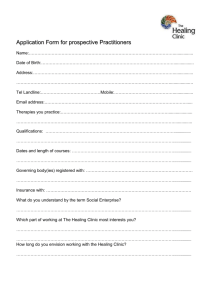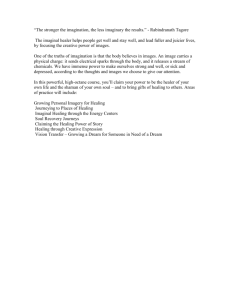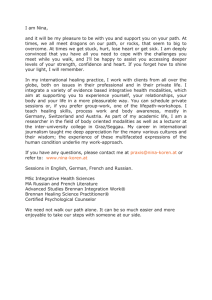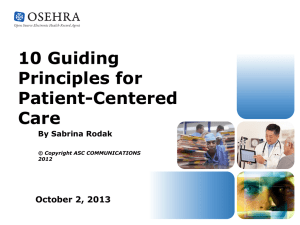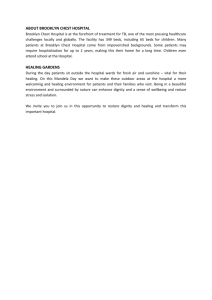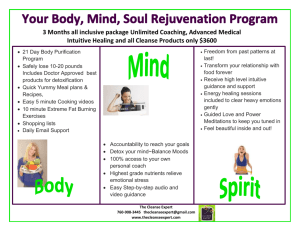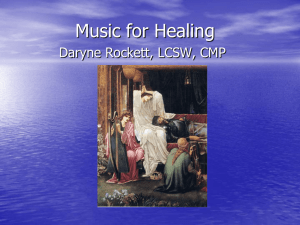What_is_Healing
advertisement
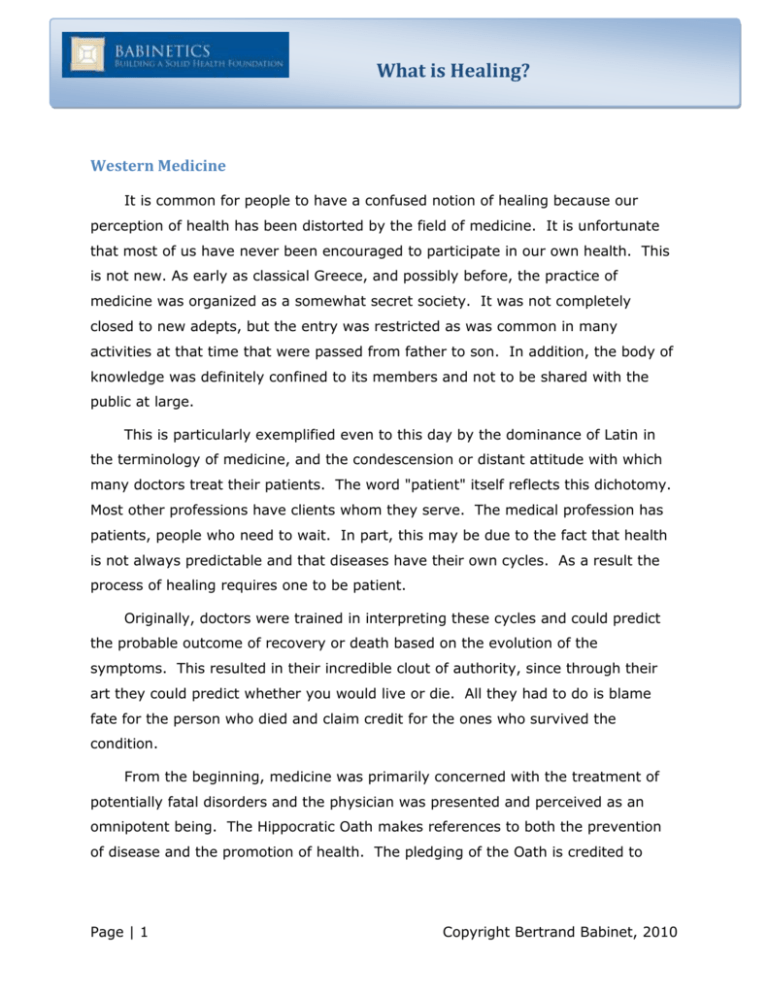
What is Healing? Western Medicine It is common for people to have a confused notion of healing because our perception of health has been distorted by the field of medicine. It is unfortunate that most of us have never been encouraged to participate in our own health. This is not new. As early as classical Greece, and possibly before, the practice of medicine was organized as a somewhat secret society. It was not completely closed to new adepts, but the entry was restricted as was common in many activities at that time that were passed from father to son. In addition, the body of knowledge was definitely confined to its members and not to be shared with the public at large. This is particularly exemplified even to this day by the dominance of Latin in the terminology of medicine, and the condescension or distant attitude with which many doctors treat their patients. The word "patient" itself reflects this dichotomy. Most other professions have clients whom they serve. The medical profession has patients, people who need to wait. In part, this may be due to the fact that health is not always predictable and that diseases have their own cycles. As a result the process of healing requires one to be patient. Originally, doctors were trained in interpreting these cycles and could predict the probable outcome of recovery or death based on the evolution of the symptoms. This resulted in their incredible clout of authority, since through their art they could predict whether you would live or die. All they had to do is blame fate for the person who died and claim credit for the ones who survived the condition. From the beginning, medicine was primarily concerned with the treatment of potentially fatal disorders and the physician was presented and perceived as an omnipotent being. The Hippocratic Oath makes references to both the prevention of disease and the promotion of health. The pledging of the Oath is credited to Page | 1 Copyright Bertrand Babinet, 2010 What is Healing? Asclepius, the God of medicine as well as his daughter, Hygeia, the Goddess of health and healing. In reality, the focus has been on the treatment of diseases. Hygeia, who has probably played a greater role in the promotion of health and well-being, has been relinquished to the notion of cleanliness, dental care, and feminine tampons. This is not to say that any of these things are not vitally important to the field of health. Yet, they fail to reflect the global level of personal and collective responsibility that we can assume in promoting and enhancing health. In fact, to this day health and healing is still primarily perceived as belonging in the hands of the medical profession and its allied fields and services. We Need a Paradigm Shift Unfortunately, the concurrent perception is that health is too complex to be the responsibility of each individual. This paradigm reflects the confusion between the treatment of disease and the promotion of health. While it may be accurate that at times the treatment of some diseases are infinitely complex and require a great deal of specialized training, on the contrary, health is a natural process that only requires common sense and a willingness to learn from our human experience. Because it does not seriously address the psycho/spiritual context of stress related disorders, the field of traditional medicine is often ineffective in treating many conditions. Some alternative approaches that tend to be somewhat more appreciative of the relationship of body, mind and spirit often have great results where traditional medicine fails. Oftentimes, this is true because practitioners are more willing to educate their clients in making necessary life style changes. They act more as coaches and realize that the real responsibility for health belongs with each individual. In order to reclaim their health, these individuals need to reconnect with their spirit and realign with their purpose of service. Page | 2 Copyright Bertrand Babinet, 2010 What is Healing? This basic understanding is sadly lacking in the field of traditional medicine, and sometimes in the various disciplines of alternative health care. All too often practitioners perceive their role as being solely responsible for the diagnosis and the treatment of the disease. In this case, health care is only a euphemism for disease care and shows no respect for the marvelous ability of our body and our psyche to heal itself In his book, Turning Point, Fritjof Capra issues a challenge to health care practitioners to start evolving a new paradigm of health which transcends the notion of treating or preventing disease, and includes a definition of what health is, independent of the treatment of mental and emotional disorders. This challenge was of particular interest to me. After many years studying various alternative health care modalities, I deliberately chose the field of Human Development for my Ph.D. to escape the notion of pathology. I wanted to examine life challenges including diseases, as phases of human development or life opportunities for growth and learning. In this process, I came across many models of healthy development including Piaget's studies of child development, Abraham Maslow’s “Hierarchy of Needs” or Erik Erickson's Stages of human development, and I gained an understanding of sequences of evolution. This was very valuable to me but it lacked an understanding of why we are here in the first place, and how we can more effectively cooperate with our individual and global functions. It has been my experience, as uncreative as it may seem, that when things are utilized according to their functions they tend to maintain themselves in better shape for longer periods of time. Extrapolating this awareness to the human condition, I started my research to discover how we could better cooperate with the process of life itself. Page | 3 Copyright Bertrand Babinet, 2010 What is Healing? My Approach Just before starting my Ph.D., I spent four years studying acupuncture and Chinese Medicine and I was struck by two facts. The first was that originally Chinese doctors were paid while their clients were healthy and stopped being paid when they were sick. I thought that this was an interesting paradigm shift since it represented an investment of the practitioner in the health of the patient and not in their dysfunction. As a result, much of the “Nei Ching,” the bible of Chinese Medicine, examines our relationship to nature and principles of healthy living. The second interesting point of my studies of Chinese Medicine was an examination of the place occupied by human beings in relation to the spiritual and the material. In other words, it started with a notion of what our purpose is and the challenges we face in meeting that purpose. This very simple exposé was very quickly forgotten in the exploration and treatment of energetic pathological syndromes. It became the focus of my own personal research and the corner stone of my approach to health, which is philosophical, educational and therapeutic. The way we examine health and healing in our work is based on the idea that we have been designed for ease and programmed for disease. Our brain, the central station of our psycho/physical connection, was designed to be connected and empowered through the will of God. Through our separation from the source of empowerment, we have had to operate out of our lower will function which is dominated by survival fears. This has created a general dis-equilibrium in our psyche which affects all the psycho/spiritual functions of the brain, and is reflected in multiple levels of our anatomy and physiology. Our work is designed to explore the nature of our psycho/spiritual difficulties and to provide a course of action to restore health by re-empowering ourselves spiritually. Page | 4 Copyright Bertrand Babinet, 2010
